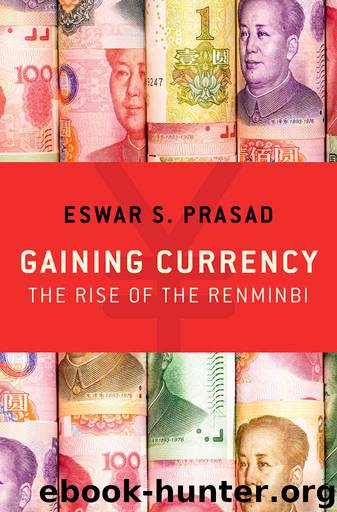Gaining Currency: The Rise of the Renminbi by Eswar S. Prasad

Author:Eswar S. Prasad [Prasad, Eswar S.]
Language: eng
Format: epub
Publisher: Oxford University Press
Published: 0101-01-01T00:00:00+00:00
CENTRAL BANK INDEPENDENCE
An important characteristic of safe haven economies is that their central banks are independent. Of course, no central bank is truly independent because it must be accountable to the public and the government it serves. Even in economies where the central bank is independent by law and has the sole objective of keeping inflation low and stable, which are the key characteristics of an inflation-targeting framework, the central bank usually decides on the level of inflation to target not just by itself, but in consultation with the government.
A central bank would soon lose its legitimacy if it undertook policies that were not seen as being in the general interest of the economy. The key aspect of independence, however, is that the central bank not be subject to the whims of politicians, who may favor growth over keeping inflation under control, which could be detrimental to the long-term health of the economy if it resulted in runaway inflation. Another consideration is that the government should not have the ability to use the central bank’s money-printing presses to finance its deficit spending, which could erode the value of the currency and set off spiraling inflation and currency depreciation. This is a temptation to which many emerging market governments have fallen prey, usually culminating in high and unstable inflation.
An even more salient characteristic for a central bank is that of operational independence. Even if the institution does not have the ability to choose its objectives, such as whether it should give higher priority to keeping inflation low or keeping the exchange rate stable, it must have the freedom to use the monetary policy instruments at its disposal to accomplish these objectives without further government interference.
These characteristics are seen as essential to give investors, both domestic and foreign, confidence that the central bank will protect the value of its currency. The major central banks such as the U.S. Federal Reserve, the European Central Bank, the BOJ, the Bank of England, and the SNB all have statutory independence, which includes operational independence for implementing monetary policy. These central banks have the independence to use the tools at their disposal, such as interest rates and the share of deposits that banks are required to hold as reserves at the central bank, to achieve their objectives. Since the financial crisis, many of these central banks have taken more drastic measures—even purchasing government bonds and other financial assets such as stocks to influence the entire spectrum of interest rates and asset prices. The key point, however, is that these central banks have undertaken such unconventional operations of their own accord, without their national governments prompting them to print money to finance budget deficits. Such operational independence is seen as critical to maintaining financial stability and the confidence of investors in the value of the currency.
In China, the notion that any government agency is independent is dubious. In the case of the PBC, however, there are some important subtleties in its relationship with the Party. For the
Download
This site does not store any files on its server. We only index and link to content provided by other sites. Please contact the content providers to delete copyright contents if any and email us, we'll remove relevant links or contents immediately.
The Meaning of the Library by unknow(2565)
Six Billion Shoppers by Porter Erisman(2296)
Why Nations Fail: The Origins of Power, Prosperity, and Poverty by Daron Acemoglu & James Robinson(2288)
No Time to Say Goodbye(2112)
Red Notice by Bill Browder(2070)
The Economist [T6, 22 Thg9 2017] by The Economist(1924)
Currency Trading For Dummies by Brian Dolan(1921)
Thank You for Being Late by Thomas L. Friedman(1766)
Bitcoin: The Ultimate Guide to the World of Bitcoin, Bitcoin Mining, Bitcoin Investing, Blockchain Technology, Cryptocurrency (2nd Edition) by Ikuya Takashima(1694)
Amazon FBA: Amazon FBA Blackbook: Everything You Need To Know to Start Your Amazon Business Empire (Amazon Empire, FBA Mastery) by John Fisher(1559)
Coffee: From Bean to Barista by Robert W. Thurston(1542)
The Future Is Asian by Parag Khanna(1480)
The Great Economists by Linda Yueh(1453)
How Money Got Free: Bitcoin and the Fight for the Future of Finance by Brian Patrick Eha(1423)
Grave New World by Stephen D. King(1418)
Pocket World in Figures 2018 by The Economist(1414)
Capitalism Without Capital: The Rise of the Intangible Economy by Jonathan Haskel(1397)
The Sex Business by Economist(1382)
Cultural Intelligence by David C. Thomas(1286)
